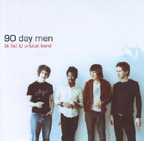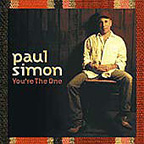|
Like an adventurous scout on a hiking trip, Radiohead have scrambled up some difficult terrain in order to get and then describe their own view of what's over the next rise in British rock. This includes the breakup of electronica into subtly tonal daydreams (which nicely dovetail with nearly freeform atonal jazz horns on the album's best track, "The National Anthem"). There's a disturbed busyness applied to U2-style majestic anthemic rock (and the 'head boys deserve credit for nailing that one, because U2's new work goes into that very direction). What's a disappointment is that those two revelations are about as far as Radiohead goes this time round. Thom Yorke gets into singing verses by the time the album's half over. And this might as well not be a two-guitar group, for all of the dependence on studio knobs over genuine instruments. Through the course of multiple listens, the mumbled vocals and dispersed bleeps gradually deliver a great deal more than their sparse face value. But given that the initial impression is of broken-up broadcasts bouncing off the farthest satellites, there's just too much space to conquer. The eventual appreciation of this album is akin to a very admirable side-project. It's not the forward-looking classic that would seem to be in the offing when a band this good is determined to head into the aural wilderness. -T.E. Lyons
 90 DAY MEN 90 DAY MEN(It (Is) It) Critical Band Southern Records Big and beautiful, the debut album by 90 Day Men sprawls in wanton sheets, where jazz and punk exchange secret mash notes from opposite sides of the bed. Like labelmates Sweep the Leg Johnny, complexity is not the point, but the propellant, as the songs slip and slide from subtle to brutal, quiet and chaos sensually wrestling to be the one on top. A swift, chugging rhythm dominates, from the locomotive bass line of the opening track "Dialed In" to the last tune, "Jupiter and Io", a chattering bundle of nerve and need. Even the softer, slower tunes, the spookhouse instrumental "Super Illuminary" and the hypnotic "Sort Of Is a Country in Love," possess a quickness of breath, a sense of constant movement. As the drums and bass whip the songs on, guitars twang and clamor; nimble fingers pluck the swirling melodies, in a heartbeat clenching into fists full of scrape and hum, the best examples being the new version of "Primadonna" and the clangorous alt-radio hit, "Missouri Kids Cuss." Vocals are mad mumbling, deadpan chants, enemy broadcasts, lover's rants. The singer answers his accusers, doom coos in French on the phone. Through it all, the keyboards float like fireflies hovering over a summer car crash. A work of intensity and intelligence, (It (is) It) Critical Band is one of the best albums of the year. Hope for the alternative scene blooms anew in my hard and haggard heart.-Bill Widener
This is one of the rare times in the last two decades that Paul Simon isn't employing his talent to conquer some kind of subcontinent like Brasilia or Broadway. He could have emphasized the dropping of all the experimental campaigns, gone the full "back to basics" route. But thankfully, the new tracks show a willingness to pick the bones of successes and failures alike. The results, particularly in performance and arrangement, make the best of the veteran singer/songwriter's vast experience. The gifts of experience are an underlying theme here. "Darling Lorraine" is an epic recollection of a very full relationship, the love of a lifetime. It's a bold choice to make this the second track of the collection - but by catching the listener early on, the shockingly well-chosen verite moments hit so fresh as to make an extraordinary emotional drama. The wryly hilarious quickie "Old" follows on the heels of heartrendingly understated singing about Lorraine's passing, and this pseudo-wake to youthfulness thus gets a setting so perfect that it can't help but become an instant classic. Later tracks in the collection eventually show that Simon's songwriting fails only in that he can't nail the hook, make the catchy chorus. The title track and "Look at That" are very enjoyable, but their ability to stick in memory is due to the little asides in the verses and Simon's great vocal performances. The musical accompaniment is notable for a light-and-right touch with the sort of world-music percussion that Simon explored on Graceland and Rhythm of The Saints. Ultimately, the low-key wise and funny lyrics, and conversational but very tuneful singing, carry over this often-great collection from a grand master of poetic pop masterpieces. -T.E. Lyons
|
||
|
|
 RADIOHEAD
RADIOHEAD  PAUL SIMON
PAUL SIMON